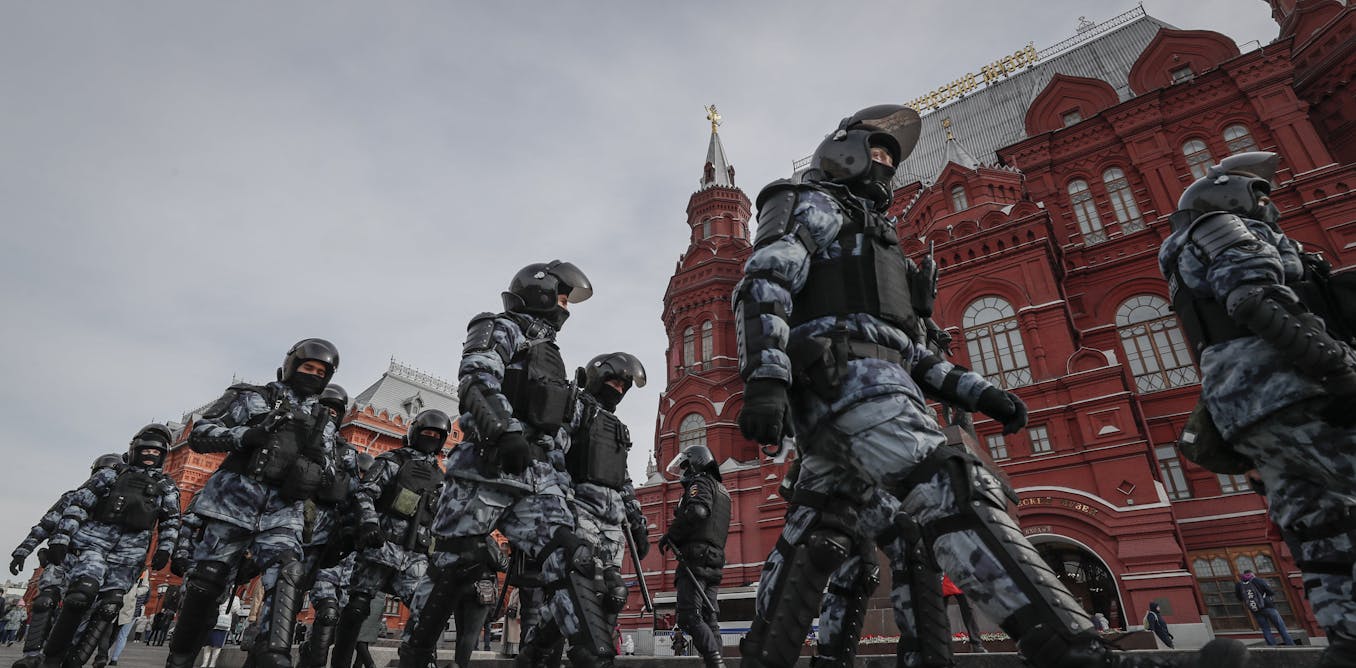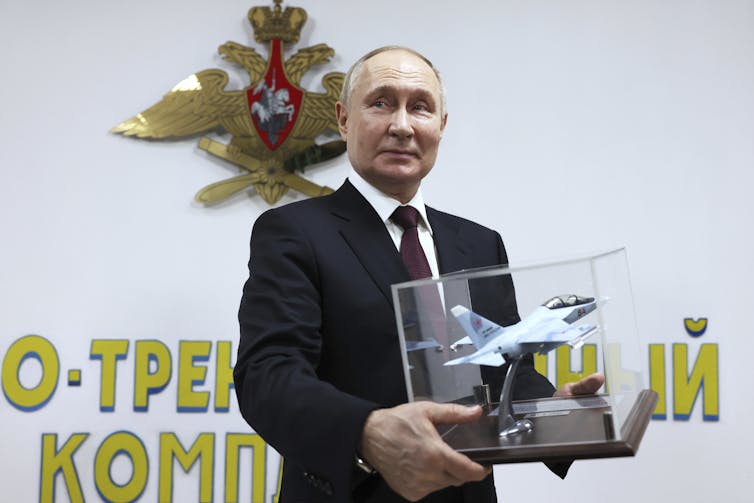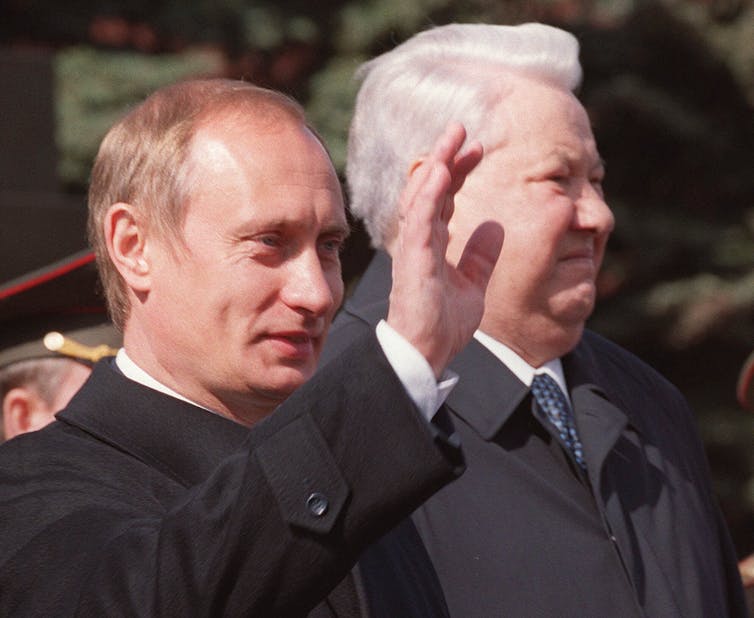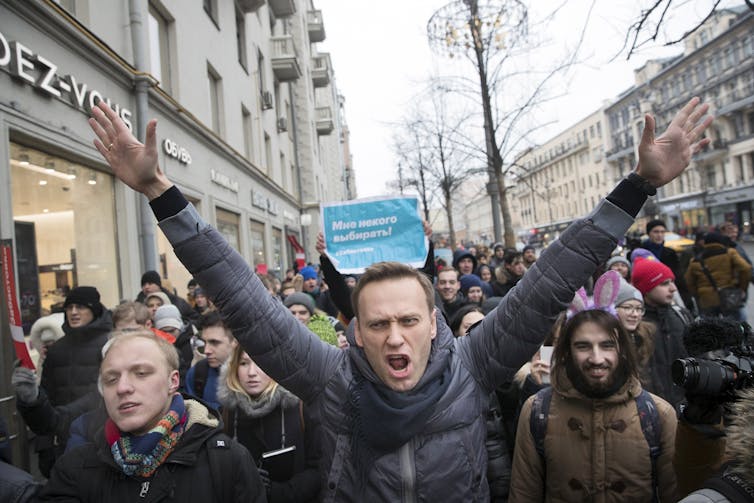
There's not too much drama in the upcoming Russian presidential election this weekend. We all know that Vladimir Putin will win. The only real question is whether he will get more than 75% of the vote.
It may be tempting to see these results as evidence of the strength of the Russian regime. The Russian military's recent gains in Ukraine appear to further support this.
But my own research – soon to be published in a journal Upcoming book Election results and Russian military gains in Ukraine appear to mask a more problematic reality for the country.
Russia's system of government is not only undemocratic, human rights violative, and unpredictable. It is also increasingly dysfunctional, trapped in a cycle of poor and weak governance that no one man, no matter how much power, can solve.

Mikhail Metzel/Pool Sputnik Kremlin/AFP
Dark Constitutional Arts
The weakness stems from the excessive centralization of power in Russia around the president.
This centralization is the product of an increasingly common logic that I call “Dark Constitutional ArtsThis logic generally holds that democracy and the protection of rights are best guaranteed under a constitutional system that concentrates power in the hands of a single elected leader. This line of thinking is present in many populist and authoritarian states, such as Hungary and Turkey.
The basis of this type of regime in Russia is the 1993 Constitution. It was drafted by then-President Boris Yeltsin and his supporters (many in the West) as a way to dismantle communism and implement radical economic reforms. As such, it contains a number of provisions on democratic rights and guarantees, along with provisions that concentrate broad power in the hands of an elected Russian president.

Anonymous/AP
Yeltsin (and his Western supporters) described this system as democratic because it made the president accountable to the people. They also argued that rights provisions would allow the courts to limit any abuses by the central state.
These reformers hoped that Yeltsin could use this concentrated power to build democracy in Russia. But thirty years later, we can see how the use of the “constitutional dark arts” backfired spectacularly.
Since 2000, Putin has ruthlessly used this central authority to eliminate any checks on power. He also transformed elections, the media, and the courts from sources of accountability into mechanisms for projecting the image of strong presidential authority.
The upcoming presidential elections are just the latest example of this.
Poor quality of governance in Russia
Although this centralized system has allowed Putin to control politics, it promotes weak and weak governance, especially outside Moscow. There are at least two factors that play a role.
First, central decision-making in Russia is often made using incomplete or incorrect information. An example of this is the large-scale Russian invasion of Ukraine in 2022. Intelligence was based on the operation It will be over quickly Ukrainians are likely to welcome Russian forces.
Second, central directives are delegated to weak, inefficient and under-resourced institutions. Russia's response to the COVID-19 pandemic has been disastrous, largely due to weak and under-resourced regional authorities. laden With a crisis of this magnitude.
This dysfunction was a central message for the political movement led by opposition leader Alexei Navalny. Before his death last month, Navalny and his team strongly criticized the Russian regime's corruption, weakness, and inability to repair roads, provide health care, and properly pay teachers and doctors.
The message was powerful, making Navalny the first opposition politician to build a broad coalition spanning all 11 of Russia's time zones.

Evgeny Feldman/AP
This broad coalition frightened the Kremlin to the point that it led to the poisoning of Navalny in August 2020. Although it is not yet clear how his political movement will respond to his death, this central criticism of the government remains one of its strongest messages.
Although it is impossible to conduct independent polls on internal issues during the Ukrainian war, Putin and his administration seem concerned about this weakness. In his speech to parliament on February 29, Putin implicitly acknowledged these problems. Promising New national projects to improve infrastructure, support families and improve the quality of life.
But this kind of promise is unlikely to be implemented. Putin has traditionally promised to make these kinds of changes around the presidential election period. But when it comes to implementing them, Russia's regional subunits often fall short There are no resources Let's do it.
With so much money now being spent on the war, the latest set of promises is unlikely to be any different.
Read more: Alexei Navalny had a vision for a democratic Russia. This terrified Vladimir Putin to the core
An increasingly dysfunctional Russia
As Putin approaches the start of his fifth presidential term, the centralization and personalization of power will increase.
Externally, this centralization is likely to create an increasingly unpredictable Russia, led by a man who makes decisions on the basis of a paranoid worldview and incorrect or manipulated information. As former German Chancellor Angela Merkel once described Putin, he is truly…Living in another world“.
This is likely to lead to more adventurism and aggression in foreign policy. This is likely to reinforce harsh repression of any dissenting voices within Russia as well.
We are also likely to see an increasingly dysfunctional Russia, a country suffering from a lack of roads, housing, schools, health care, and more infrastructure It will continue to deteriorate, especially outside Moscow.
Read more: More corruption, division and ostracism: How Vladimir Putin changed Russia over more than two decades
This extends to the army that remains weak Despite its recent gains on the battlefield. For example, Russia Overly centralized command structure It decimated the officer class and led to heavy losses in equipment. Although Russia has managed to get by by relying on its vast human and industrial resources, these systemic problems severely affect its fighting capacity.
Despite escalating repression, these problems present an opportunity for a democratic challenger, especially when Putin is inevitably replaced by another leader.
Russia's dysfunctional government also serves as an important reminder for Western media, policymakers, and commentators. Although this should not be a reason for complacency, highlighting mismanagement in Russia is an important tool in combating the image of power and control that the Kremlin carefully creates.

“Travel specialist. Typical social media scholar. Friend of animals everywhere. Freelance zombie ninja. Twitter buff.”





More Stories
Taiwan is preparing to face strong Typhoon Kung-ri
Israel orders residents of Baalbek, eastern Lebanon, to evacuate
Zelensky: North Korean forces are pushing the war with Russia “beyond the borders”